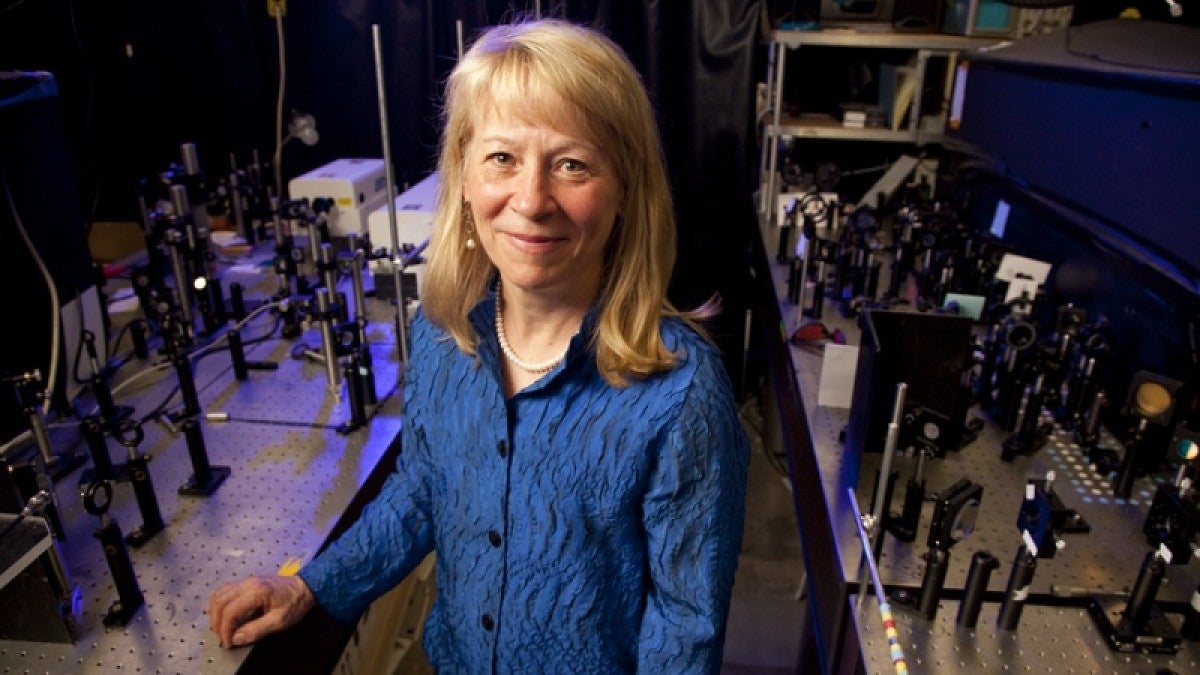UO chemist Geraldine Richmond has been confirmed as the new undersecretary of science and energy for the federal Department of Energy following a voice vote by the U.S. Senate.
Richmond holds the Presidential Chair in Science at the UO and is a recipient of the National Medal of Science. Her research focuses on understanding the molecular characteristics of water surfaces, studies that have relevance to environmental issues such as oil remediation, atmospheric chemistry and alternative energy sources.
The undersecretary for science oversees the Energy Department’s Office of Science, advises the secretary of energy on energy and technology issues, monitors the department’s research and development programs, and advises the secretary on management of the DOE’s national laboratories, among other duties.
“It comes as no surprise that Professor Richmond would be chosen for such an important position,” said UO President Michael Schill. “She is the gold standard of academics, and is well known for her many achievements as a researcher, scholar and advocate for women in the sciences. Professor Richmond will no doubt drive innovation and discovery for our country in this role.”
U.S. Energy Secretary Jennifer M. Granholm said Richmond’s record of public service and commitment to building an inclusive workforce will aid the department’s efforts to transition to a clean energy economy and accelerate innovation.
“As a renowned scientist, researcher and teacher, Dr. Geraldine Richmond has made historic contributions to the fields of chemistry and physics and has diligently applied that research to power breakthroughs in the fight against the climate crisis,” Granholm said. “That is why I am so grateful that the Senate confirmed Dr. Richmond to serve as Under Secretary of Science at the Department of Energy.”
In an August appearance before the Senate Committee on Energy and Natural Resources, Richmond said she would be honored to lead the DOE’s science programs.
“From my visits over the years to DOE laboratories, I know firsthand that they are indeed the crown jewels of the nation’s research and innovation domain,” she said. “These labs, along with thousands of initiatives funded by competitive DOE grants, are achieving the groundbreaking discoveries and breakthroughs that long have made United States the envy of the world in science and engineering.”
Among her other accomplishments, Richmond has designed state-of-the-art laser systems, optics equipment and computers that work in tandem to understand molecular processes at liquid surfaces that have environmental importance.
In addition to her presidential honors, Richmond has received numerous other awards, including the Presidential Award for Excellence in Science, Mathematics and Engineering Mentoring from President Clinton in 1997 and the American Chemical Society’s highest honor, the Priestley Medal, in 2018. She is a member of the National Academy of Sciences and is a fellow of the American Academy of Arts and Sciences, the American Chemical Society, the American Physical Society and the Association for Women in Science.
Richmond also has been a pioneer in advocating for the advancement of women in science.
In 1998, Richmond and Jeanne Pemberton of the University of Arizona co-founded COACh, the Committee on the Advancement of Women Chemists. The organization has delivered a series of successful workshops on negotiation, leadership and conflict resolution to more than 15,000 women in all fields of science and engineering around the U.S.


